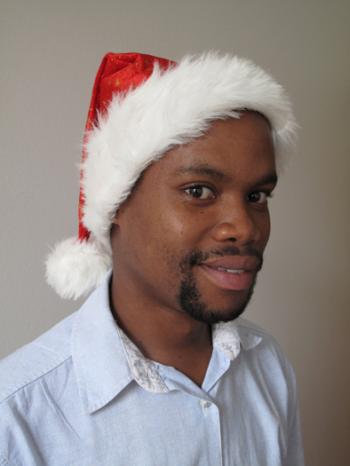Posted on December 12, 2010

Back in Cape Town in the air-conditioned mall and in the stuffy local butchery the same Christmas carols the exhausted man was butchering float through the air. The thrust is the same: the idea of Christmas sells things. At this time of year people retreat home to show off the new things they have accumulated throughout the year, and to pig out and binge. And, by the way, it's Christmas. That's the excuse for doing all this.
I have seen these scenes of singing men in Santa suits repeated around the country many times over the years. The carols are ubiquitous. Each November (or is it September nowadays?) when the Christmas marketing campaigns begin I wonder all over again what Christmas means. Is it now just another opportunity for us to be made to believe we need things that we don't, accompanied by vaguely connected evocations of Jesus Christ? It is clear to me that each time Christmas is mentioned the story of Jesus Christ, and the Christian story of the creation of the earth and human beings, are always implied. What does the overwhelming presence of Christmas mean to people who are not Christian? Even when we sing the national anthem, we call out, 'Nkosi sikelel' iAfrika' (God bless Africa). Are we not inadvertently calling up the Christian God?
More importantly, when I think about what stories of my family's pasts to tell, I wonder when my family adopted Christianity. What stories of human origination were told by my ancestors before, say, 1850 that gradually were displaced by Christian narratives? Being Christian was the norm into which my parents were born and they have been part-time Christians all their lives. They cannot tell me when Christianity was taken up in their families on the one hand. On the other hand they also perform rituals in honour of their ancestors. Yet they can only go back two generations when they tell us about our ancestors on either side. The past becomes very hazy until the Christian story of the creation of the earth kicks in and gives us a past. But what stories were told before Christianity became the commonly accepted religion of the majority in southern Africa?
This month's blogs give us a fascinating glimpse into other ways of speaking the long past. Musa Hlatshwayo has compiled what today are little-told stories of the origins of many groups in KwaZulu-Natal from Credo Mutwa's book, Indaba, My Children (1998) and from interviews with some historians. When compiled today, such stories raise questions: are these stories that were told before the rise of Christianity displaced them? The part about the southward migration of the abantu and their separation into kinship groups sounds very similar to A.T. Bryant's version in Olden Times in Zululand and Natal (1929). Is this a story that existed before Bryant and was simply reproduced by him? Or does this story show the feedback loop between oral and written traditions given that Bryant has been criticised for making up these migrations, 'tribes' and 'clans' in line with the mythology of the settlement of southern Africa that had been developed by European settlers in the second half of the 19th century?
In a different vein, 'Dima and Jahe', recorded in the 1950s by Lorna Marshall, and /Ui's story, 'The Love Tree', which was recorded by Melissa Heckler in northern Namibia, present even lesser-known takes on creation. The stories have been made available to the Archival Platform by Marlene Winberg. They show some of the understandings of the long past that have been overwhelmed by the Christian version. The continuing replacement of our pasts by the Christian version was brought home to me in an interview I conducted with Kapilolo Mario Mahongo, a well-known !Xun storyteller. Mahongo continues the oral narrative tradition of the !Xun, even travelling around the world telling stories. Yet when I asked him if he could tell any stories of the origins of human beings, his answer was that the only narrative he knows is the Christian one.
I wonder then if part of telling our ancestral stories should be trying to recover how they understood creation and the history of the earth before they became Christian. Is this even possible?
Mbongiseni Buthelezi is the coordinator of the Archival Platform's Ancestral Stories initiative